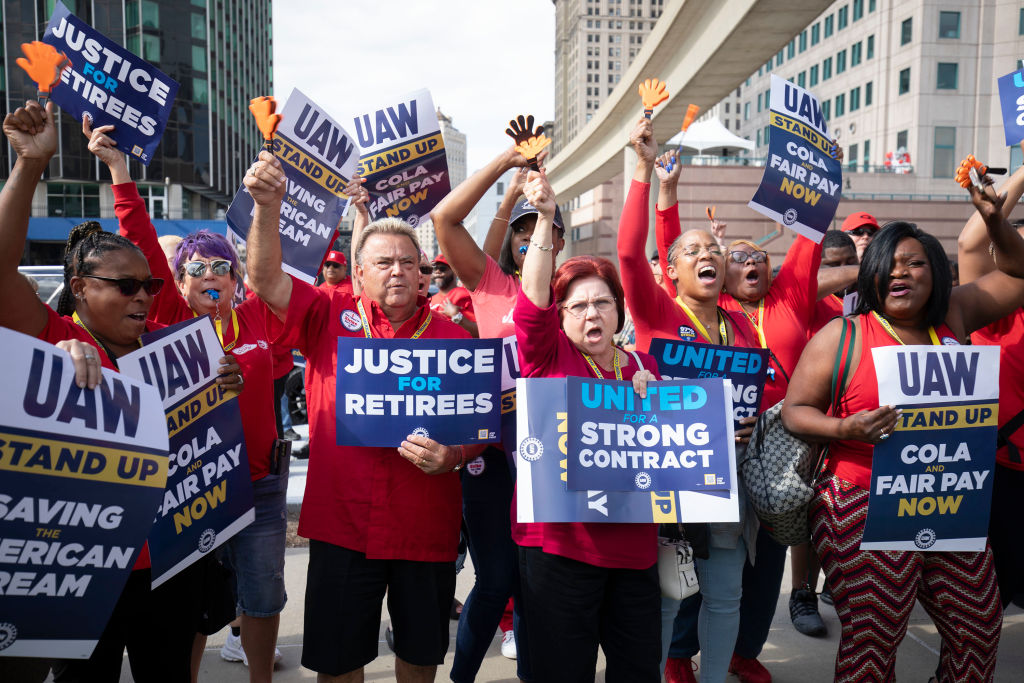Detroit: Auto workers’ strike puts Democrats in a bind
President Biden will have to pick a side between the debate

A free daily email with the biggest news stories of the day – and the best features from TheWeek.com
You are now subscribed
Your newsletter sign-up was successful
The smartest insight and analysis, from all perspectives, rounded up from around the web:
The battle between striking autoworkers and Detroit’s Big Three is about “the biggest technological transformation since Henry Ford’s moving assembly line,” said Jack Ewing in The New York Times. Close to 13,000 workers at three plants — one each at Ford, General Motors and Stellantis — walked off the job last week in a dramatic bid by the United Auto Workers to protect traditional auto jobs in the shift to electric vehicles. With “fewer parts, EVs can be made with fewer workers.” That’s one reason the union is pushing for big pay increases at EV plants, totaling roughly 40% over four years. But the UAW also believes that a win against the Big Three will give it “a strong calling card” in future efforts to “organize employees at Tesla and other non-union carmakers like Hyundai.”
Detroit’s auto companies are already “at a considerable competitive disadvantage” compared with non-union carmakers like Tesla, said National Review in an editorial. And things are going to get much worse, for the Big Three and for buyers. The Biden administration has “used legislation and the administrative state to push electric vehicles far faster than the technology permits.” Now the UAW, which “has kept the donations flowing” to Democrats, wants the government to back demands that will drive car prices to new records. “The ultimate losers will be union members when their jobs disappear,” said The Wall Street Journal in an editorial. Already, carmakers are attempting to “build their EVs as far away from the UAW’s reach as possible,” whether in Mexico or in right-to-work states like Indiana and Kentucky.
The Week
Escape your echo chamber. Get the facts behind the news, plus analysis from multiple perspectives.

Sign up for The Week's Free Newsletters
From our morning news briefing to a weekly Good News Newsletter, get the best of The Week delivered directly to your inbox.
From our morning news briefing to a weekly Good News Newsletter, get the best of The Week delivered directly to your inbox.
Don’t let automakers plead poverty, said Michael Hiltzik in the Los Angeles Times. “The Big Three as a group have not been this financially flush in nearly a decade.” They reported combined profits of $20 billion in the first half of 2023. Meanwhile, this automotive stoppage is having nowhere near the economic impact of past stoppages, when the footprint of the domestic auto industry was much bigger. Today, an extended strike might have local effects in the Midwest, but “most Americans won’t feel it.” The UAW is justified in its worry that carmakers will use electrification to do an end run around the union, said Jamie Lincoln Kitman in Politico. But its resistance to clean energy is “an embarrassing move.” The union has allowed itself to be “weaponized by the industry to promote its anti-green agenda,” villainizing vital energy initiatives.
The strike puts President Biden in an awful spot, said Bloomberg in an editorial. “Union Joe” has always offered unconditional support to organized labor. However, his administration also “wants to accelerate the transition to a green-energy economy.” You can see the dilemma. But Biden has to pick a side. The strikes are “a moment of reckoning for the Democratic Party,” said Rana Foroohar in the Financial Times. “The wealthy coastal progressives who drive the Teslas” care more about fixing climate change than about labor rights. But if Biden can’t get the unionized workers’ support — he has yet to receive a UAW endorsement — it leaves an opening for Donald Trump to steal votes in crucial Midwestern swing states.
This article was first published in the latest issue of The Week magazine. If you want to read more like it, you can try six risk-free issues of the magazine here.
A free daily email with the biggest news stories of the day – and the best features from TheWeek.com
-
 Colbert, CBS spar over FCC and Talarico interview
Colbert, CBS spar over FCC and Talarico interviewSpeed Read The late night host said CBS pulled his interview with Democratic Texas state representative James Talarico over new FCC rules about political interviews
-
 The Week contest: AI bellyaching
The Week contest: AI bellyachingPuzzles and Quizzes
-
 Political cartoons for February 18
Political cartoons for February 18Cartoons Wednesday’s political cartoons include the DOW, human replacement, and more
-
 Currencies: Why Trump wants a weak dollar
Currencies: Why Trump wants a weak dollarFeature The dollar has fallen 12% since Trump took office
-
 Elon Musk’s starry mega-merger
Elon Musk’s starry mega-mergerTalking Point SpaceX founder is promising investors a rocket trip to the future – and a sprawling conglomerate to boot
-
 TikTok: New owners, same risks
TikTok: New owners, same risksFeature What are Larry Ellison’s plans for TikTok US?
-
 Will SpaceX, OpenAI and Anthropic make 2026 the year of mega tech listings?
Will SpaceX, OpenAI and Anthropic make 2026 the year of mega tech listings?In Depth SpaceX float may come as soon as this year, and would be the largest IPO in history
-
 Leadership: A conspicuous silence from CEOs
Leadership: A conspicuous silence from CEOsFeature CEOs were more vocal during Trump’s first term
-
 Ryanair/SpaceX: could Musk really buy the airline?
Ryanair/SpaceX: could Musk really buy the airline?Talking Point Irish budget carrier has become embroiled in unlikely feud with the world’s wealthiest man
-
 Powell: The Fed’s last hope?
Powell: The Fed’s last hope?Feature Federal Reserve Chairman Jerome Powell fights back against President Trump's claims
-
 Taxes: It’s California vs. the billionaires
Taxes: It’s California vs. the billionairesFeature Larry Page and Peter Thiel may take their wealth elsewhere